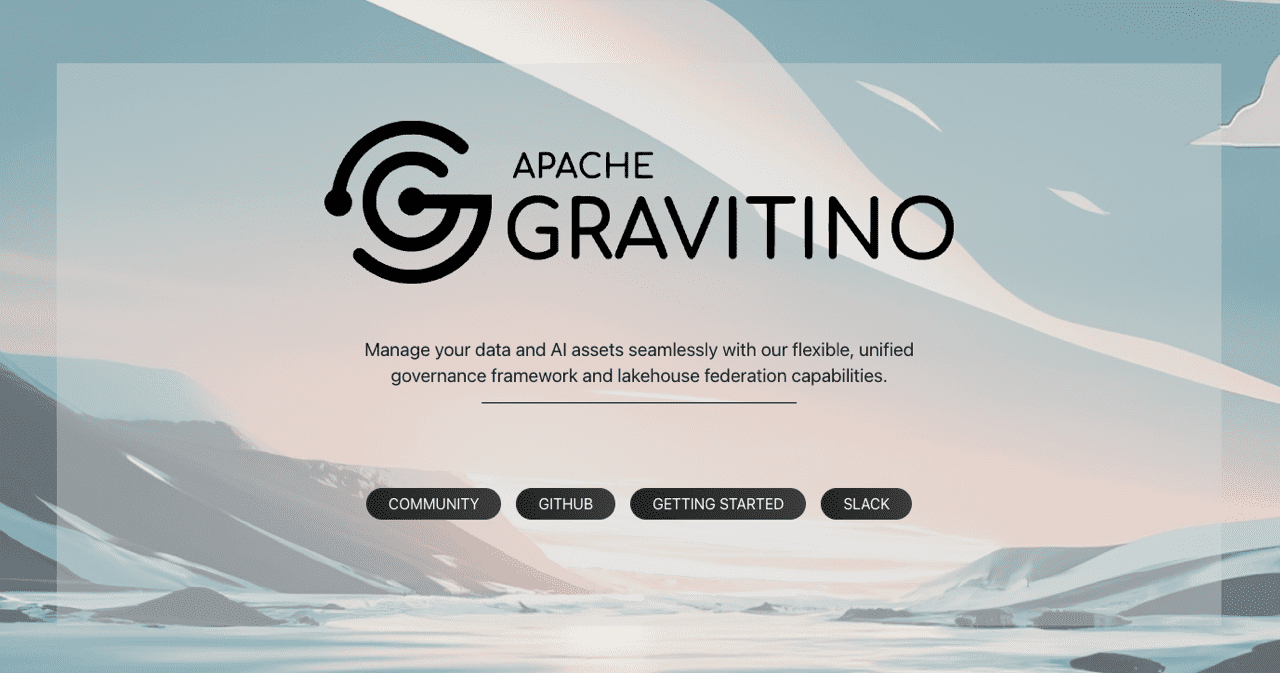Apache Software Foundation’s latest top-level project tackles enterprise data fragmentation with groundbreaking metadata lake architecture
The Apache Software Foundation has graduated Apache Gravitino to top-level project status, signaling a major shift in how enterprises approach data management and governance. The open-source data catalog platform, which has rapidly gained traction with 2.3K stars on GitHub, positions itself as a compelling alternative to proprietary solutions like Databricks’ Unity Catalog, offering enterprises a vendor-neutral path to unified data management.
Tech Giants Rally Behind Open Data Catalog Initiative
Apache Gravitino has attracted an impressive roster of industry leaders to its community, including Uber, Apple, Intel, Pinterest, eBay, Xiaomi, Cloudflare, AWS, Tencent, Yahoo, Roku TV, Confluent, Cloudera, DuckDB, and LlamaIndex—a clear indication that major technology companies are seeking alternatives to vendor-locked catalog solutions.
The project’s rapid ascension to Apache top-level status—a milestone that typically requires years of community building and technical maturity—underscores the urgency of solving enterprise data fragmentation. Organizations today face mounting challenges managing data scattered across multiple clouds, regions, and technology stacks, creating what industry experts call “the new data silo problem.”
Junping Du, Co-Founder and CEO of Datastrato, the company behind Gravitino’s initial development, said:
Apache Gravitino represents a paradigm shift from attempting to physically consolidate data to instead unifying metadata. This ‘metadata lake’ approach delivers the benefits of centralized data management without the astronomical costs and complexity of actually moving petabytes of data.
Former Uber Tech Lead Praises Gravitino’s Impact
Quanlai Li, who previously worked as an engineer on Uber’s data platform team, spoke enthusiastically about Gravitino’s potential to transform enterprise data architecture.
Having dealt with massive-scale data catalog challenges at Uber, I’ve seen firsthand how fragmented metadata creates bottlenecks for data teams, Apache Gravitino’s federated approach and open architecture solve problems that proprietary solutions simply can’t address—especially for organizations committed to avoiding vendor lock-in.
Li’s new venture, ChatSlide.ai, has adopted Apache Gravitino to tackle the massive data catalog issues inherent in building AI-powered data platforms.
We evaluated several catalog solutions, including commercial offerings, but Gravitino’s ability to federate existing catalogs while providing a unified API made it the clear choice. It’s particularly powerful for AI applications that need to understand and access data across heterogeneous sources.
His endorsement carries weight given his background in hyperscale data infrastructure and his current focus on AI-driven data solutions—precisely the use cases where unified metadata management becomes mission-critical.
Open Source Challenges Proprietary Giants
The competitive landscape for data catalogs has been dominated by cloud vendors and platform providers, each promoting proprietary solutions that create ecosystem lock-in:
- Databricks Unity Catalog: While powerful, it’s tightly coupled to the Databricks platform and creates challenges for organizations with multi-platform strategies
- Snowflake Polaris Catalog: Recently open-sourced but designed primarily for Snowflake-centric architectures
- AWS Glue: Deeply integrated with AWS services, making multi-cloud strategies difficult
- Google BigLake: Optimized for Google Cloud Platform, limiting portability
- Microsoft OneLake: Part of Microsoft’s Fabric ecosystem with similar lock-in concerns
Apache Gravitino differentiates itself through genuine openness and vendor neutrality. The platform supports:
✓ Catalog Federation: Connects to existing catalogs (Hive Metastore, Iceberg REST, Kafka Schema Registry, ML Model Registries) without requiring migration ✓ Multi-Model Data Management: Handles tabular data, filesets, vector embeddings, and messaging streams through unified APIs ✓ Full Open Table Format Support: First-class support for Apache Iceberg, Hudi, and Delta Lake ✓ Broad Engine Compatibility: Works with Spark, Trino, Flink, StarRocks, Doris, PyTorch, TensorFlow, and more ✓ Fine-Grained Governance: Centralized security, access control, and compliance policies ✓ Data Lineage & Auditing: Complete visibility into data flows and access patterns
Jerry Shao, Co-Founder and CTO of Datastrato and Apache Spark committer, explained:
What makes Gravitino unique is that it doesn’t force you to abandon your existing catalog infrastructure. You can federate your Hive Metastore, Iceberg catalogs, and other metadata systems under a single pane of glass while maintaining full functionality. This ‘catalog of catalogs’ approach is fundamentally different from solutions that require rip-and-replace migrations.
Architected for the AI Era
While traditional data catalogs focused primarily on metadata management for analytics, Apache Gravitino is designed with AI and machine learning as first-class use cases. The platform’s architecture anticipates the rise of “data agents”—LLM-powered systems that autonomously discover, understand, and process data to answer complex questions.
Du said:
Next-generation data platforms are AI-driven intelligent platforms. Datastrato is building the foundational infrastructure for this future, where data agents can navigate an organization’s entire data estate, understand semantic relationships, and execute sophisticated data operations with minimal human intervention.
The roadmap reflects this vision, with three major capability areas planned:
Phase 1: Knowledge Base (v1.0, July 2025)
- Advanced statistics system for understanding data distributions
- Query planning support for intelligent data navigation
- Enhanced authentication and access control
Phase 2: Action Framework (v1.1 and beyond)
- Job system for executing data operations
- AI functions for intelligent transformations
- Automated maintenance actions (TTL, compaction, clustering)
Phase 3: Policy Enforcement
- Automated governance and compliance policies
- Intelligent data classification and labeling
- Privacy-preserving access controls
This AI-first approach positions Gravitino to enable use cases that traditional catalogs struggle with:
Automated Data Engineering: Data engineers describe requirements in natural language—”Create a daily sales aggregation joining MySQL, S3, and Kafka data”—and AI agents discover sources, understand schemas, generate pipeline code, and execute jobs.
Intelligent Governance: Data stewards leverage agents to automatically classify and label sensitive data across the organization, applying appropriate policies based on regulations like GDPR and CCPA with human oversight but minimal manual effort.
Natural Language Analytics: Business users ask questions like “What were our top products in Q4 across all regions?” without SQL knowledge. AI agents understand the question, discover datasets, generate optimized queries, and return answers in seconds.
Media Coverage Highlights Industry Significance
The significance of Apache Gravitino’s approach has not gone unnoticed by both academic and industry publications. Stanford Tech Review recently published an in-depth analysis titled “Apache Gravitino: Building the Future of Intelligent Data Architecture”, exploring how the metadata lake paradigm could reshape enterprise data management.
The Stanford coverage emphasized Gravitino’s potential to solve what researchers call “scaling laws for data”—the idea that just as cloud computing enabled scaling of compute resources and LLMs enabled scaling of model capabilities, unified metadata management enables scaling of data utilization across organizational boundaries.
SF Bay Area Times has also covered the trend, featuring how local startups are fighting the data catalog issue with innovative open-source solutions like Gravitino, highlighting real-world success stories from the Bay Area tech ecosystem.
Community Growth Signals Market Validation
Since its initial release, Apache Gravitino has demonstrated impressive community traction:
- 2.3K GitHub stars and growing rapidly
- Contributors from 20+ major tech companies
- 4 major releases planned for 2025 (v0.8 through v1.1)
- Active developer community with regular releases and feature additions
- Production deployments at Fortune 500 companies
The GitHub repository shows consistent commit activity, with contributions spanning catalog connectors, governance features, security enhancements, and performance optimizations. The community maintains comprehensive documentation and provides responsive support through Slack channels.
Community member testimonials highlight practical benefits:
Gravitino eliminated the need to migrate our Hive Metastore while giving us a modern API for new workloads.
— Data Platform Engineer, Fortune 500 retailer
The ability to apply governance policies across all our catalogs from one place has been transformative for our compliance posture.
— Chief Data Officer, Financial Services
We’re using Gravitino to build AI agents that can discover and understand data across our entire organization. No other catalog solution offers this level of API consistency.
— ML Platform Lead, Tech Company
Datastrato: The Company Behind the Open Source Project
While Apache Gravitino is an independent open-source project governed by the Apache Software Foundation, Datastrato serves as its primary commercial sponsor and contributor. The company, founded by veterans of the big data ecosystem including Apache Hadoop, Spark, and Ozone committers, offers enterprise support, managed services, and additional proprietary features built on top of the open-source foundation.
Datastrato’s business model follows the successful pattern established by companies like Databricks (with Apache Spark), Confluent (with Apache Kafka), and Elastic (with Elasticsearch)—contributing heavily to open source while building a sustainable business around enterprise needs.
Du stated:
We believe open source is the right foundation for critical data infrastructure. No single company should control how the world’s data is cataloged and governed. By building Gravitino as an Apache project, we’re ensuring that the metadata layer remains open, interoperable, and community-driven.
Open Standards and Ecosystem Integration
Apache Gravitino’s commitment to open standards extends beyond its own Apache licensing. The project actively participates in and supports broader open data ecosystem initiatives:
Apache Iceberg REST Specification: Gravitino implements the Iceberg REST catalog API, ensuring compatibility with the growing Iceberg ecosystem including Spark, Trino, Flink, Dremio, and Snowflake.
OpenLineage: Integration planned for standardized data lineage collection and propagation across tools and platforms.
OpenMetadata Compatibility: Interoperability with OpenMetadata for enhanced data discovery and collaboration features.
Cloud-Native Standards: Support for Kubernetes deployment, containerization, and cloud-native operational patterns.
This standards-based approach ensures Gravitino fits naturally into existing data architectures rather than requiring wholesale replacement of functional systems.
The Competitive Advantage of True Openness
When asked how Gravitino competes with well-funded proprietary offerings, Shao pointed to fundamental architectural differences:
Unity Catalog and similar solutions assume you’ll standardize on their platform. That creates a dilemma for enterprises that need best-of-breed tools for different workloads. Do you compromise on your analytical database choice to get catalog integration? Or do you accept fragmented metadata?
Shao continued:
Gravitino eliminates that false choice. Use Snowflake for your data warehouse, Databricks for machine learning, Confluent for streaming, and specialized vector databases for AI—Gravitino unifies the metadata layer while you optimize each workload independently.
This architectural philosophy resonates particularly with large enterprises that have heterogeneous environments built over years and can’t simply standardize on a single vendor platform—even if they wanted to.
Industry Implications: The Shift to Metadata-Centric Architecture
Apache Gravitino’s emergence reflects a broader industry trend: the recognition that metadata management is foundational to AI-era data platforms. As organizations move from traditional analytics to AI-powered decision-making, the ability to discover, understand, and govern data at scale becomes critical.
Du observed:
We’re witnessing a shift from data-centric to metadata-centric architectures. Organizations can’t afford to physically centralize all their data—it’s too expensive, too slow, and often impossible due to regulatory constraints. But they can and must centralize metadata to achieve a coherent view of their data estate.
This shift has significant implications for data architecture decisions:
Multi-Cloud Strategies Become Viable: With unified metadata management, organizations can confidently distribute data across AWS, Google Cloud, and Azure based on cost, performance, and regulatory requirements without creating governance gaps.
Best-of-Breed Tool Selection: Teams can choose specialized tools for specific workloads knowing they’ll integrate through the metadata layer rather than forcing standardization on a single platform.
Regulatory Compliance: Data privacy regulations like GDPR, CCPA, and industry-specific requirements become easier to enforce when metadata policies can span all data systems.
AI/ML Acceleration: Machine learning teams can discover and access training data across organizational silos, dramatically reducing the time from idea to deployed model.
Getting Started and Contributing
For organizations interested in evaluating Apache Gravitino, the project offers multiple entry points:
Quick Start: Docker-based deployment for testing and development available at the https://github.com/apache/gravitino
Documentation: Comprehensive guides for installation, configuration, and integration: https://gravitino.apache.org/docs
Community Support: Active Slack workspace and mailing lists for questions and discussions
Commercial Support: Datastrato offers enterprise support subscriptions, managed services, and professional services for production deployments: https://datastrato.ai
Developers interested in contributing can find good first issues labeled in the GitHub repository, and the community maintains contributor guidelines and code review processes aligned with Apache Software Foundation standards.
Conclusion: The Open Alternative to Proprietary Catalogs
As enterprises grapple with increasingly complex data landscapes, Apache Gravitino offers a compelling vision: unified metadata management without vendor lock-in, built on open standards and community governance. Its rapid growth—evidenced by adoption at major tech companies, 2.3K GitHub stars, and graduation to Apache top-level project status—suggests the market is ready for an alternative to proprietary catalog solutions.
For organizations committed to open-source infrastructure, multi-cloud flexibility, or simply seeking the best tools for each workload, Apache Gravitino represents a strategic choice. It’s not just a catalog; it’s the foundation for the next generation of AI-driven data platforms.
About Apache Gravitino Apache Gravitino is a top-level project at the Apache Software Foundation providing a unified metadata lake for heterogeneous data sources. The open-source platform enables organizations to federate existing catalogs, apply consistent governance, and build AI-powered data applications across their entire data estate.



































